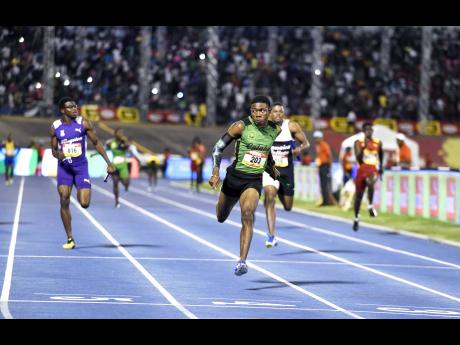Oral Tracey | ISSA rule well-intentioned but flawed
The complaints from directly affected school communities, coaches and administrators have been consistent for several years, indeed, several decades, regarding the transfer, or 'recruiting' or 'buying', of talented student athletes, generally from schools with weaker sports programmes to schools with stronger ones.
The simplistic idea is that talented footballers and sprinters should be left at their original schools and that these recruiting schools should develop their own talent. Another shallow idea is that the big schools with big programmes are using and exploiting the recruited students. Suffice to say that the world has evolved from the place and space where those sterile views were formed. To be against the principle of recruiting in the Jamaican reality is to effectively put the welfare of the schools and the school communities ahead of the welfare of the individual youngsters.
The essence of recruiting in the Jamaican context is generally about giving poor Jamaicans with exceptional sporting talent a better opportunity to maximise their potential. Transferees invariably move from weaker programmes to stronger ones in the same way that migrants move from countries with weaker economies and more oppressive realities to more prosperous and democratic jurisdictions. That is the general principle of recruiting not just in the Jamaican high-school context, but as a wider worldwide phenomenon.
The new transfer restrictions announced by the Inter-Secondary Schools Sports Association (ISSA), while well-intentioned, go against perhaps the most basic human instincts of survival and betterment of self. The spurious notion of a level playing field where all things are equal is a clichÈd tool of deception used to keep the dreamers dreaming and distanced from reality.
ISSA comprises over 170 member schools. The schools with advanced and well-funded sports programmes across all sports total approximately 10 or 15, with another 10 or 15 having reasonably functional programmes in select sports. Therefore, approximately 30 of 170 schools, which is approximately 17 per cent of Jamaican high schools, have solid sports programmes, which leaves over 80 per cent of ISSA member schools with relatively poorly funded and poorly organised programmes. Typically, these are the smaller schools with children from the poorest communities, where statistically, it is shown that the most elite sporting talents tend to emerge from these circumstances. What these changes are implying is that more of these youngsters should remain in their underdeveloped programmes and waste their talent away.
Limiting transferees who can be registered to play to three for football, cricket, and hockey; two for netball; volleyball, and basketball, and for track and field two per class per season,on the face of it seems a reasonable compromise that was meant to keep everyone happy and should theoretically over time, open up high-profile competitions such as the Manning Cup, the daCosta Cup, and Boys and Girls' Athletics Championships to more schools having a chance to win. apparently good selling points for these new rules. In principle, however, even incremental restrictions of the movement of talent in search of overall betterment of the individual will hurt more than it helps in the long run.
QUESTIONABLE RESTRICTION
The most questionable aspect of this new transfer policy is the restriction placed on student athletes at the sixth-form level. These are students who are have already completed and matriculated through the mandatory five-year school cycle. Sixth-form, or grade 12 and 13-places are supposed to be optional and up to the discretion of the respective schools. ISSA circumvents more ridicule here by allowing any number of students to transfer but mandating that only a limited amount of them per year can be registered to play sports. Crafty administrative bullying at its worst.
Despite their noble intentions, the principals of ISSA, by the implementing of these new regulations, erred. These would be great and desired developments in a perfect world where true equality exists, but out here in the real world of 2018 Jamaica, the betterment and the future of the individual youngsters must take precedence over the immediate and fickle feel-good element of the school communities.

